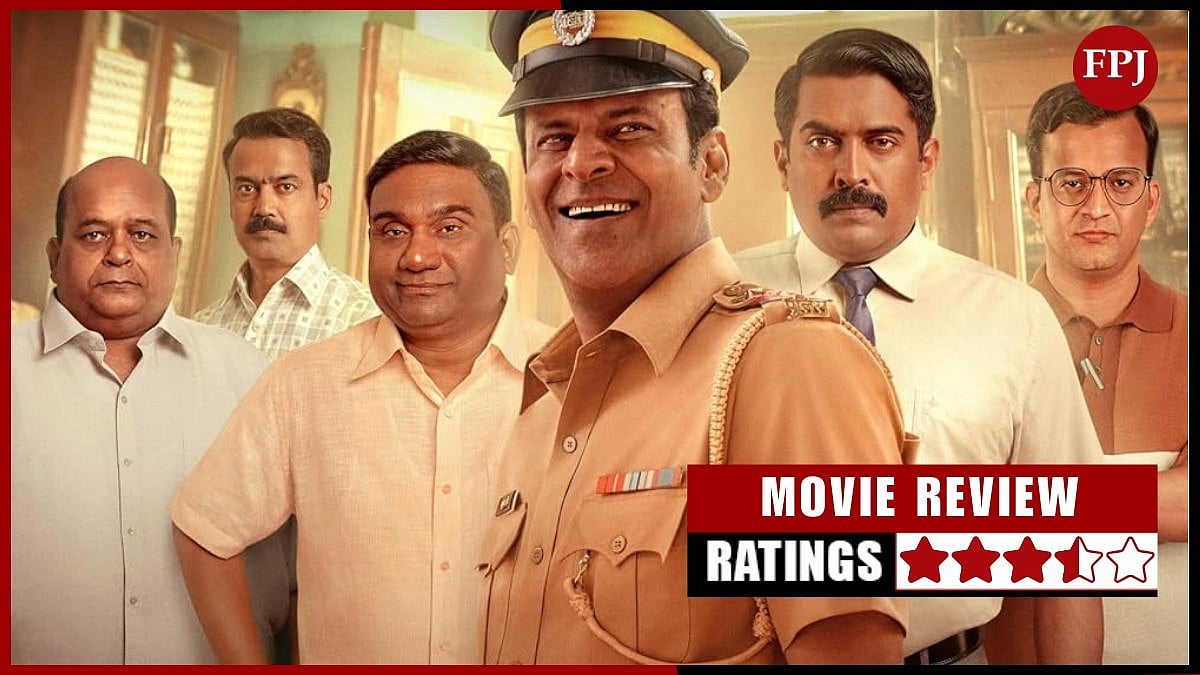Title: Inspector Zende
Director: Chinmay Mandlekar
Cast: Manoj Bajpayee, Jim Sarb
Where: Netflix
Rating: 3.5 Stars
Bollywood has never been shy of milking infamous criminals for cinematic fodder, and Inspector Madhukar Bapurao Zende, known in real life for hauling in Charles Sobhraj (twice, no less), seems ripe for a send-up.
This film isn’t a serious retelling; instead, it gleefully pirouettes into parody, with Carl Bhojraj (a thinly veiled Charles Sobhraj) cast as the “Swimsuit Killer” snake, and Zende positioned as the mongoose from Mumbai’s middle-class burrow. The setup has all the makings of a tense thriller. Tihar jailbreaks, international manhunts, a rogue with 32 alleged murders on his conscience, but the filmmakers opt for a winking, self-aware tone, often amusing, sometimes exhausting. For the director, making his maiden debut, it’s a bold if uneven experiment in spoof territory.
The problem, though, is balance. For every inspired gag about Zende’s humdrum simplicity rubbing up against the menace of Carl Bhojraj, there’s an overcooked gag that smacks of sitcom. The narrative slithers between parody and caricature, leaving the audience unsure whether to applaud the mongoose or pity it. Still, in a landscape littered with solemn crime dramas, the film’s refusal to take itself too seriously is, oddly enough, its saving grace.
Actors' performance
This is Manoj Bajpayee’s parade. As Zende, he turns a potentially one-note parody into a performance brimming with warmth, wit, and weary dignity. His middle-class ticks and quiet sincerity make you root for him, even when the script veers into silliness. Bajpayee has played serious cops before; here, he plays one who knows the comedy of being serious, and that’s the masterstroke.
Jim Sarbh, meanwhile, is the slick snake in the grass. His Carl Bhojraj is equal parts charm and menace, slithering with a confidence that occasionally outshines the film’s intended silliness. Yet, for all his talent, the script does not allow him to do justice to the character. Written more perfunctorily than persuasively, Carl feels underexplored, leaving Sarbh to elevate a role that deserved sharper fangs.
Girija Oak as Zende’s wife adds depth with her understated charm, anchoring Bajpayee in tender domesticity. Their chemistry is refreshingly genuine, an oasis amid the parody. Sachin Khedekar, cast as the benign boss, is… fine. The supporting cast bring sincerity to their fleeting moments, proving that even the background actors understand the assignment better than the screenplay sometimes does.
Music
Period detail is where the film flexes muscle. The 1980s come alive in dusty browns, earthy palettes, and production design that smells faintly of naphthalene balls and cassette tapes. Cinematography lovingly recreates Mumbai and Goa in sepia nostalgia, a choice that elevates the parody into something resembling cultural memory.
Then there’s the music, or rather, the one oddball number. The climax song, “Hangyo, Hangyo,” mutating into “Lukka Chuppi…,” is audaciously absurd yet somehow works. It propels the climactic action sequence with playful energy, reminding viewers that the film doesn’t seek applause for realism but chuckles for its cheeky daring.

FPJ verdict
Overall, a refreshing detour from solemn true-crime dramas, the film benefits from Bajpayee’s charm, Sarbh’s villainy, and retro flair. Yet it wobbles between parody and tribute, ending more middling than memorable.
